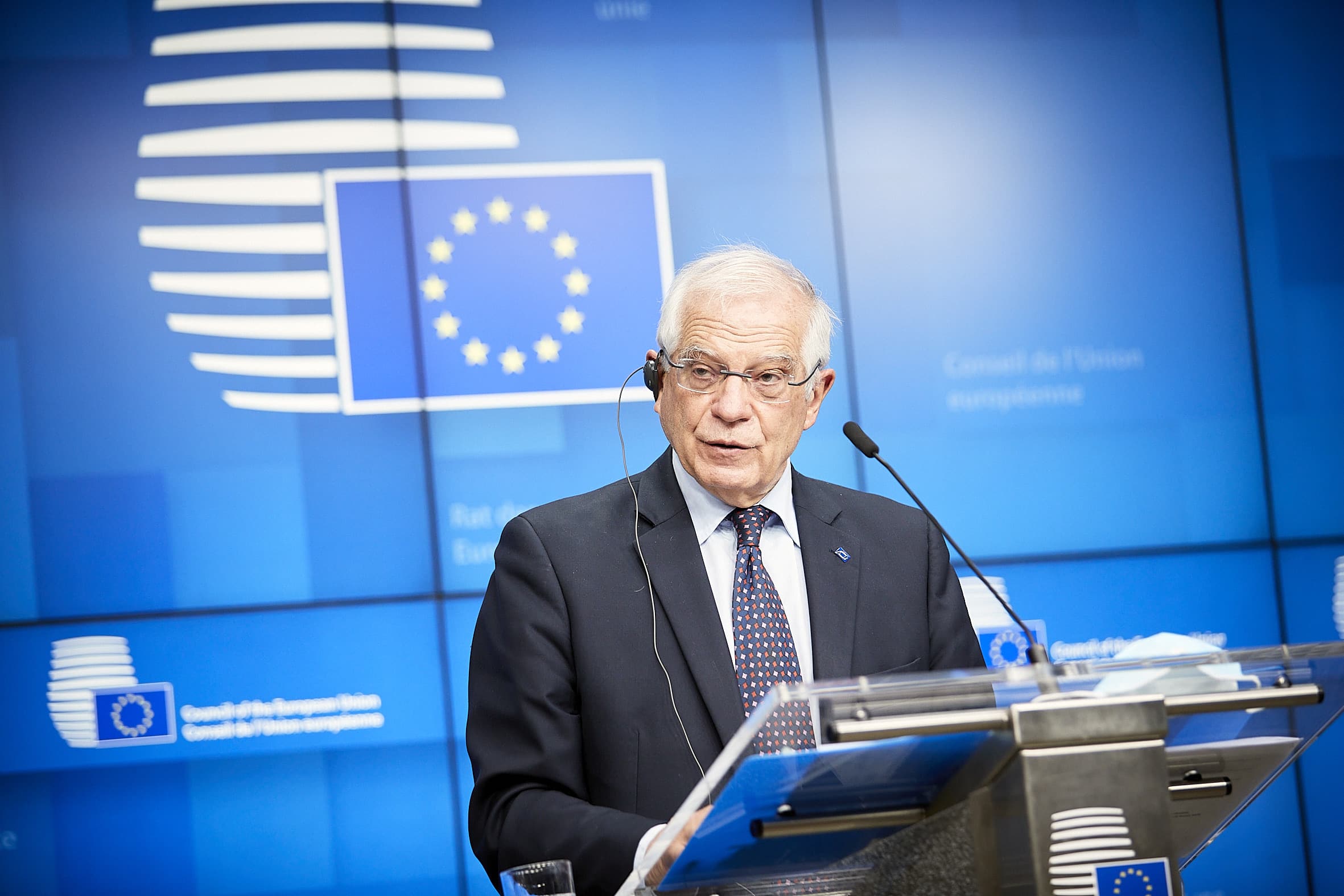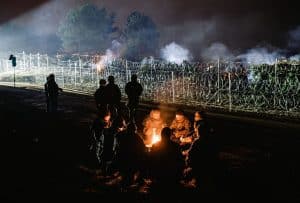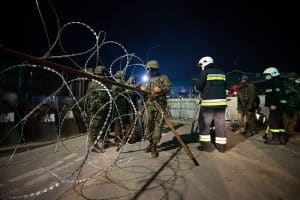Image: High Representative of the EU for Foreign Affairs and Security Policy Mr Josep Borrell giving a press conference on the 22nd of February 2021.
Additional sanctions against Belarus by the European Union and United States are becoming more likely, following the sentencing of two journalists and raids on human rights organisations in a week that saw a severe escalation of the ongoing government crackdown on activists and journalists.
On February 18th, two journalists from Belsat, a Polish-based television station aimed at Belarus, were sentenced to prison for two years. The two young journalists, Katsyaryna Andreyeva (27) and Darya Chultsova (23), had been arrested in Minsk in November. They had been covering a rally that commemorated Raman Bandarenka – a young man who died after reportedly being beaten by Belarusian security forces during a protest. Andreyeva and Chultsova were accused of “disrupting civil order” for covering the rally. The two journalists, backed by various Belarusian human rights organisations, rejected these charges, as their only reason to be at the rally was to do their job as reporters.
Earlier that week, Belarusian authorities raided the private homes and offices of at least 40 journalists and human rights activists. The offices of the Vyasna human rights center in Minsk and the headquarters of the Association of Belarusian Journalists were among the organisations whose offices were searched. More than 30 people were briefly detained by authorities, while several others remain in police custody.
The events of last week are a severe escalation of the ongoing violent government crackdown on activists and journalists in Belarus. The country has seen continuous protests since president Lukashenko was declared the landslide victor of the August 2020 elections. The elections have been widely regarded as fraudulent by human rights organisations, the EU and the US. Massive protests have brought tens of thousands of Belarusians onto the streets, demanding that the longtime authoritarian leader – who has been in office since 1994 – steps down and that democratic elections be held. Security officials have cracked down hard on the protesters. More than 30,000 people have been arrested since mass protests began, including dozens of journalists who covered the rallies. Several protesters have also been killed and there is credible evidence of torture being used against those who have been arrested. The main opposition figures have been pushed out of the country into exile. Lukashenko continues to cling to power and refuses dialogue with the opposition.
The European Union, the United States and other countries have refused to recognize Lukashenko as the legitimate leader of Belarus, and have enacted sanctions and restrictive measures. The sanctions are aimed at Aleksandr Lukashenko and other high-level government officials who are responsible for the violent repression, as well as a handful of oligarchs and companies that feed the regime money. As of last December, a total of 88 individuals and 7 entities are on the EU’s blacklist. Sanctions include a travel ban – which forbids entering or transiting EU territories – and an asset freeze – which targets the funds and economic resources of the listed individuals and forbids European citizens and companies from having business dealings with them.
So far, the EU’s sanctions have not stopped the suppression in the country or led to any dialogue between the government and the opposition. Opposition leaders are disappointed by the EU’s moderate approach, and have been calling for harsher sanctions, which they expect will put pressure on the government to start a dialogue and transfer of power. In January of this year, opposition leader Sviatlana Tsikhanouskaya requested the European Union to speed up approval of its fourth package of sanctions, and urged both Europe and the United States to be “braver and stronger” in their response to the authoritarian regime, calling the international response “still too modest.”
It may not quite be the “stronger” response that the opposition is hoping for, but the events of last week have brought on further action from the West. United States Secretary of State Antony Blinken said in a statement on February 18th that Washington is alarmed by the continuing violent crackdown, expressing concern about the raids and sentences of last week. Consequently, the US imposed additional visa restrictions on 43 Belarusians associated with the regime. The EU in turn discussed the situation in Belarus yesterday, on the 22nd of February 2021, during its monthly Foreign Affairs Council meeting. Following the meeting, EU High Representative for Foreign Affairs Josep Borrell said that the EU “would consider the adoption of further sanctions,” in light of the recent events.
The EU has so far chosen not to enact harsher economic sanctions, for instance a ban on Belarusian oil. This is likely out of concern that too much pressure will push Belarus into deeper economic and military integration with Russia, which sees Belarus as a buffer state against Europe and NATO. Whether the escalation of last week will be enough to convince the EU to overcome this hesitation and move forward with the fourth package of sanctions, remains to be seen.
Author: Jarne van der Poel
Sources: EUobserver, BrusselsTimes, Europa.eu, Reuters1, Reuters2, RadioFreeEurope1, RadioFreeEurope2, RadioFreeEurope3
Image: European Union



